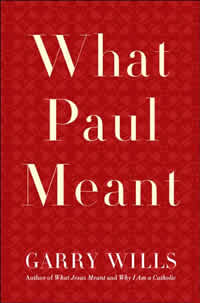Book Notes
 Garry Wills, What Paul Meant (New York: Viking, 2006), 193pp.
Garry Wills, What Paul Meant (New York: Viking, 2006), 193pp.
In his book Papal Sin: Structures of Deceit (2000) Garry Wills left readers wondering why he remained Catholic given his unsparing criticisms of institutional Catholicism. He tried to answer that question two years later with Why I Am A Catholic (2002). With five books on Saint Augustine, and his book Lincoln at Gettysburg (1993) that won the Pulitzer Prize, Wills remains one of our country's most important public and outspokenly Christian intellectuals. Today he is Professor of History Emeritus at Northwestern University. In this sequel to What Jesus Meant (2004), Wills tries to rescue Paul from those who view him as "the first corrupter of the doctrines of Jesus" (Thomas Jefferson).
There's a sense in which Wills agrees with detractors like Jefferson, or Bernard Shaw, who excoriated Paul as a "monstrous imposition" upon the gentle Jesus, for at the end of the day he too excises what he considers is a "massive misreading" of Paul by interpreters like Augustine, Luther, Calvin, Pascal, and Kierkegaard, with their emphases on sin, guilt, election, justification, and predestination. Wills's Paul is a radical egalitarian who taught the same ethic of indiscriminate love as Jesus (cf. 1 Corinthians 13), and a "heroic traveler" who logged more than ten thousand miles to spread this love. In his view, later "impersonators and interpolators" turned Paul into a misogynist and anti-Semite. Undergirding this interpretation of Paul are two critical presuppositions—that most everything that Luke writes about Paul is "nonsense, exaggeration, poetic creation, [and] fiction," and that only seven of the epistles attributed to Paul are authentic. So much for canonicity (contrast, for example, Jaroslav Pelikan on Luke in his book Acts).
Still, I appreciated Wills's intent to argue that "what Paul meant was not something other than or contrary to what Jesus meant, but that we can best find out the latter by studying the former. His letters stand closer to Jesus than do any other words in the New Testament." Wills was a classicist who taught Greek for many years, so I also appreciated the appendix with his translations of key words, an effort to move readers from stubborn anachronistic and linguistic accretions that have bred over-familiarity ("gathering" instead of "church," for example, or "emissary" instead of "apostle.").


